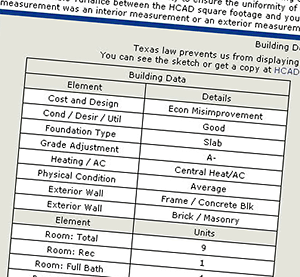COMMENT OF THE DAY: A PROPERTY TAX PROTESTOR’S GUIDE TO HCAD BUILDING GRADES  “There is no process to request that a home be considered an economic misimprovement. When a neighborhood has changed to the point that the original homes are no longer the norm, either by new construction or remodeling, HCAD can deem the remaining original homes as econ improvements.
On to grade — Grade is set when the home is constructed. There is usually a discussion between the builder and the appraisal district as to what level of customization is going into the property as it’s being built. Think of a typical Pulte starter-home as a C+. For every level of better materials or customization, the grade will be increased up to a maximum of X+. This is, for the most part, impossible to change on a permanent basis. Especially after the construction is complete. The key here is to get in either during construction or immediately after. It helps if your home is exactly the same as the rest on the block, but for some reason, your grade is higher. Bring in floor plans and show which houses are similar.
On to Condition/Desirability/Utility (CDU) – This is the one you can play with. A home with a reasonable amount of un-repaired deferred maintenance should be in Average condition. In the old days, all new homes were put on at Excellent condition, but HCAD has since changed that policy and puts most new homes on in Average condition. This is the one you need to work on with signed written repair estimates and pictures. Every year. Big stuff — electric, plumbing, foundation, windows, storm damage, etc.
Finally, Level of Remodel — None, partial, extensive, total, new/rebuilt. This causes a great deal of angst to many people, because there is no real written explanation of what each one is, and how long a remodel actually lasts. There are homes from the early 90s in West U that are still being considered New/Rebuilt, and, as such, are being compared to brand new construction. Additionally, HCAD does not know about every remodel — they only started getting the building permits about 6 years ago. So, your neighbor with the spectacular new kitchen who did it under the table may still be listed as having no remodel. Unless you want to bring in pictures of their kitchen from the last BBQ, there’s not much you can do, other than show that yours is in worse shape than HCAD shows. Additionally, many ARB boards and appraisers have different ideas as to what makes a remodel — putting new cabinet doors up in the kitchen? I’ve seen that called a partial remodel. Replacing knob and tube wiring without increasing capacity to avert a possible fire? I’ve seen that called a repair, and not an improvement.” [BrewWench, commenting on How Do You Get on HCAD’s ‘Cheap’ List?] Illustration: Lulu
“There is no process to request that a home be considered an economic misimprovement. When a neighborhood has changed to the point that the original homes are no longer the norm, either by new construction or remodeling, HCAD can deem the remaining original homes as econ improvements.
On to grade — Grade is set when the home is constructed. There is usually a discussion between the builder and the appraisal district as to what level of customization is going into the property as it’s being built. Think of a typical Pulte starter-home as a C+. For every level of better materials or customization, the grade will be increased up to a maximum of X+. This is, for the most part, impossible to change on a permanent basis. Especially after the construction is complete. The key here is to get in either during construction or immediately after. It helps if your home is exactly the same as the rest on the block, but for some reason, your grade is higher. Bring in floor plans and show which houses are similar.
On to Condition/Desirability/Utility (CDU) – This is the one you can play with. A home with a reasonable amount of un-repaired deferred maintenance should be in Average condition. In the old days, all new homes were put on at Excellent condition, but HCAD has since changed that policy and puts most new homes on in Average condition. This is the one you need to work on with signed written repair estimates and pictures. Every year. Big stuff — electric, plumbing, foundation, windows, storm damage, etc.
Finally, Level of Remodel — None, partial, extensive, total, new/rebuilt. This causes a great deal of angst to many people, because there is no real written explanation of what each one is, and how long a remodel actually lasts. There are homes from the early 90s in West U that are still being considered New/Rebuilt, and, as such, are being compared to brand new construction. Additionally, HCAD does not know about every remodel — they only started getting the building permits about 6 years ago. So, your neighbor with the spectacular new kitchen who did it under the table may still be listed as having no remodel. Unless you want to bring in pictures of their kitchen from the last BBQ, there’s not much you can do, other than show that yours is in worse shape than HCAD shows. Additionally, many ARB boards and appraisers have different ideas as to what makes a remodel — putting new cabinet doors up in the kitchen? I’ve seen that called a partial remodel. Replacing knob and tube wiring without increasing capacity to avert a possible fire? I’ve seen that called a repair, and not an improvement.” [BrewWench, commenting on How Do You Get on HCAD’s ‘Cheap’ List?] Illustration: Lulu
Tag: HCAD
 A reader whose new property tax assessment is feeling pressure from all the construction nearby in Brooke Smith writes in with questions about HCAD’s “economic misimprovement” classification. That’s the label HCAD often applies to older houses in neighborhoods where similar structures are being torn down and replaced with new construction. (It’s “an adjustment to the dwelling to limit the remaining building value as the land value increases.”) Writes the homeowner: “I was wondering if my fellow co-readers would have any information about filing your home as an economic misimprovement and how to do so with HCAD. Also, are there any disadvantages of doing so?”
A reader whose new property tax assessment is feeling pressure from all the construction nearby in Brooke Smith writes in with questions about HCAD’s “economic misimprovement” classification. That’s the label HCAD often applies to older houses in neighborhoods where similar structures are being torn down and replaced with new construction. (It’s “an adjustment to the dwelling to limit the remaining building value as the land value increases.”) Writes the homeowner: “I was wondering if my fellow co-readers would have any information about filing your home as an economic misimprovement and how to do so with HCAD. Also, are there any disadvantages of doing so?”
Some background: “I bought my home in 2012; my property taxes from 2011–2012 increased by 40 percent. I prepared a thorough protest, but the ARB essentially denied my protest by comparing my home to the new homes/heavily remodeled homes in the neighborhood.”
More:
ENOUGH SQUARE FOOTAGE TO QUIBBLE OVER “We bought a fairly new house this year. We were all surprised when the appraiser’s square footage was 7 percent (200 square feet) smaller than what they had listed on HAR. Turns out the builder built the original owners a smaller house than they paid for. Some of their original closing documents showed the smaller square footage, but others had the larger number, so we understood why they were confused. We adjusted our offer price based on the revised square footage and called it good. . . . BUT as it turns out [the original owners] had been paying property taxes on the larger square footage. Now it’s our turn to pay the property taxes and I’d like to get the square footage corrected. Our estimate is that we’ll be overpaying by $600 this year if the error isn’t fixed. Unfortunately, I’m reading this information [PDF] from the HCAD website. I’m not sure whether this is a ‘clerical error’ or a ‘substantial error.’ For a substantial error, you apparently can’t protest unless the error causes the property to be over-appraised by more than one third (!). And for clerical errors, they say that inaccuracies in estimation such as estimating the square footage of a house, cannot be changed. I’m guessing I could push this as a clerical error (tell them they must have transposed some numbers when filling in their system). Has anyone done this with success? Or are we just screwed?” [Swamplot inbox; previously on Swamplot]
HCAD TAX PROTEST SETTLEMENT PROTEST The largest property-tax consultant in the state agreed last November to an $800,000 settlement with the attorney general’s office that requires it to pay a penalty to the Texas Department of Licensing and Regulation, restricts some of the company’s business practices, and establishes a restitution fund for clients. But the agreed judgment doesn’t require O’Connor & Associates to admit any wrongdoing. A 2-year-old lawsuit alleged that the company routinely represented thousands of taxpayers in property-tax protests without their consent, failed to appear at some clients’ appraisal hearings, submitted documents that were “fraudulently notarized,” and failed to file more than 11,000 legally required client forms to the Harris County Appraisal District. Company president Patrick O’Connor denies the charges, and tells the HBJ‘s Jennifer Dawson his company was picked on by HCAD because it is big and aggressive: “The firm filed 150,000 to 160,000 protests in 2010, at least seven times the volume of its next closest competitor, O’Connor said. ‘Yes, we do make mistakes, but the percentage is a very low percentage. . . . It’s about four per 1,000 hearings that we did.’†[Houston Business Journal; consumer alert]
HCAD APPRAISALS: THE $500K DIVIDE 45 percent of the 860,000 single-family-home appraisals completed by HCAD so far this year show a lower market value than last year; 39 percent are the same, and 16 percent have gone up. “‘Appraisal value is down about 2.5 percent (overall),’ said Assistant Chief Appraiser Gus Griscom of the completed figures. . . . Homes valued at $500,000 or more received the highest percentage of actual value increases. Homes valued at $250,000 or less were given the highest percentage of value reductions. Overall, of the statements currently being mailed, homes valued at more than $500,000 saw their market values increase on the average anywhere from 5.17 percent at the lower end to 5.81 percent for homes valued at $1 million or more. The above-$500,000 valuation group accounts for a little more than 3 percent of the appraisals being mailed.” [River Oaks Examiner]

Who came up with the name “iSettle” for HCAD’s new online settlement system for property-tax-assessment protests? It’s a name that appears crafted to attract the most docile of protesting taxpayers — which should work out well for the appraisal district: If you’re one of those more contentious homeowners who won’t settle for iSettle’s email offer in response to your protest, HCAD staff won’t even bother scheduling an informal meeting for you with an HCAD appraiser. You go straight to a formal hearing!
If you file your protest on line using iFile and indicate a realistic opinion of value, your account may be selected for an on-line settlement offer. The appraisal district reviews the protest and its own evidence, as well as trends in reductions in surrounding properties. If your suggested value falls within those parameters, a settlement offer will be sent to you at the email address you give when you file. Normally, you will have 10 days in which to log on to the iFile website and accept the offer. If you accept the offer, you won’t need to attend any appointments. The records will be changed and you will receive confirmations via email and regular mail. If you do not accept or do not respond, your account will be scheduled for a formal hearing . . . with the appraisal review board.
If you aren’t otherwise inclined to protest your home’s appraisal in person or hire a firm to do it for you, iSettle is probably worth trying. But personable homeowners with negotiating skills who’ve been able to finagle appraisal reductions in the informal meetings may want to avoid it.
And iSettle won’t be available to everyone anyway:
The iSettle process will be available only to individual homeowners. Most neighborhoods are eligible, but a few neighborhoods are not because of the complexity of the market in those neighborhoods. If you aren’t eligible, we’ll notify you.
Heights residents: This means you.
Harris County homeowners might worry that the nationwide downturn in the real-estate market will ultimately affect the prices they can get for their homes, but HCAD says there’s no problem: Things are looking up! To prove it, the agency has raised property-tax assessments an average of seven percent this year. How’s that for a vote of confidence?
Sounds even more flattering than the Chronicle, which comes off sounding insufficiently boosterish. Their survey last week declared that home prices in 2006 had risen an average of only 4.3 percent in the greater Houston area.
- Appraisals up 7%, but tax bills should shrink [Houston Chronicle]
- Houston area home prices continue to climb [Houston Chronicle]

